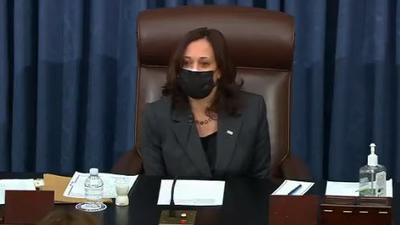
The House has just approved the Senate’s amendments to the stimulus-bill budget plan that were approved during the 15-hour “vote-o-rama”, leaving the plan on path to reconciliation.
Hours earlier, President Biden told reporters that he would insist on the $1.4K stimulus “as Americans were promised,” while Nancy Pelosi added that the House would move at breakneck speed to guide the plan to completion by March 15. There are still several steps to go, as the budget plan – well, it’s a stimulus bill, but it’s being pushed out under the protection of budget rules to prevent a filibuster – moves into the reconciliation process.
Democrats moved to push through President Joe Biden’s $1.9 trillion stimulus plan with or without – most likely without – Republican support. Following an hours-long “vote-o-rama” (a sophisticated legislative procedure, for those who aren’t familiar), VP Kamala Harris cast her first tie-breaking vote to approve the budget plan in the Senate.
The deciding vote came early Friday morning, after about 15 hours of all-night debate, and votes on dozens of amendments. In the end, the Senate found itself in a 50-50 partisan deadlock, allowing Harris to break the tie in a 0530ET vote…
Vice President Harris casts her first tie-breaking vote in the Senate-at 5:30am after 10 hours of debate-passing the budget resolution that allows for the passage of Biden’s $1.9 trillion covid relief package in the coming weeks without Republican support. pic.twitter.com/N013pnsPXO
— Amee Vanderpool (@girlsreallyrule) February 5, 2021
… but not before a series of amendments were passed to the budget plan that passed the House on Wednesday. Reuters offered an example: the Senate added a measure calling for increased funding for rural hospitals whose resources have been strained by the pandemic.
Shortly before the final vote, Democrats upped the pressure on Republicans by using amendments to reverse three earlier Trump-era votes that Republicans had won. This involved stripping support for the Canada-to-United States Keystone XL pipeline that Biden has blocked and support for hydraulic fracking to extract underground oil and natural gas.
Also overturned was a Republican amendment barring coronavirus aid to immigrants living in the United States illegally.
Given the changes approved by the Senate, the revised bill will now be kicked back to the House, which will need to approve the changes and agree on the Senate’s language. After all that is done, there is still one last step: Democrats will come together to craft the final relief bill, and pass it under special budget rules allowing them to circumvent a Republican filibuster in the Senate. The special rule is called “reconciliation”,
Democratic leaders like Chuck Schumer, the legislative leader in the Senate, said the vote was a “giant first step” toward passing comprehensive coronavirus aid. Budget Chairman Bernie Sanders added that adoption means help is on the way to those suffering from an “economic collapse.”
“Tonight we can say to them we understand the pain that they are experiencing and we are going to do something about it,” Sanders said.
Dems want to spend the $1.9 trillion to speed COVID-19 vaccines throughout the US, while some of the money would extend to special unemployment benefits that will expire at the end of March and make direct payments to people to help them pay bills and stimulate the economy. Dems also would like to send money to state and local governments dealing the worst health crisis in decades, a measure that Republicans have fought to oppose, arguing it would merely subsidize spendthrift blue states.
Meanwhile, a group of 10 GOP senators who met with Biden at the White House on Monday have sent him a letter pointing to the fact that significant amounts of money already appropriated by Congress have not yet been spent.
In a tweet, Georgia Sen. Jon Ossoff, who, along with his colleague, Sen. Raphael Warnock, tipped the Senate into Democratic control in an early-January runoff, fired off a tweet minutes after the vote that got a lot of attention on twitter, as Dems reminded the GOP how the Georgia special election played into their control of the Senate.
And with Vice President @KamalaHarris casting the crucial tie-breaking vote, at 5:30am after 14 hours of debate, the Senate has passed a $1.9 trillion budget for COVID relief. Georgia voters made this possible.
— Jon Ossoff (@ossoff) February 5, 2021
When it comes to the stimulus checks, senators delivered a message to the Biden administration during an early Thursday vote that direct payments should be tailored to those who need the money the most (what some on the left might call “means testing). The Senate voted 99-1 to recommend that high-income earners not qualify for a new round of government checks that could amount to $1.4K for individuals (and possibly $3K per child, if Mitt Romney has his druthers, though it looks like his statement from yesterday was more about virtue signaling).
Via Zero Hedge
